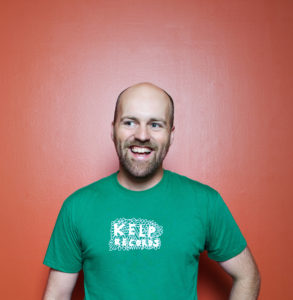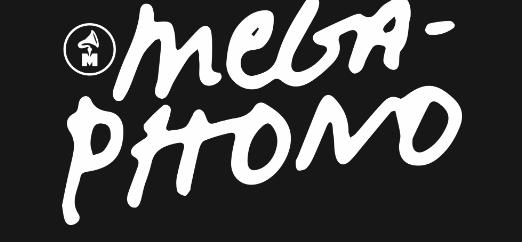The drive for five is almost upon Megaphono.
The fifth music industry conference/showcase/get together and all around good time is set to open this weekend (Feb. 7-9) bigger and with a longer reach than ever before.
For the first time music industry people from Eastern Europe will be on hand to check out talent from Ottawa, Montreal and Toronto and perhaps book them to festivals in Estonia, or Poland, or Croatia.
For Jon Bartlett, of Kelp Music, the event he founded continues to fulfill its purpose.
“We haven’t deviated too far from previous years,” he said in an interview. “The value of what we do and what is unique about it is bringing a collection of music industry people to town.

Jon Bartlett of Kelp Music and Megaphono
“One of biggest gaps we have here in Ottawa is we have a tiny music industry and for people who work in music here, they don’t have a lot of access to what is out there in the world and what is possible.
“It’s what we do with our management company. We are export focused. We understand that the world is a lot bigger than Ottawa and Canada. And this year, more than ever, we have been able to assemble a pretty impressive delegation from around the world.”
About 50 industry delegates will be in Ottawa, he said.
Working with the Canadian Independent Music Association, Megaphono is bringing promoters and festival managers from Poland, Estonia, Croatia and Macedonia.
“That will be great because Eastern Europe is a really high growth market now in terms of digital streaming and in terms of live venues. Festival growth is really big too. The music economy in those countries is growing really quickly as is the adoption rate for streaming platforms like Apple, Spotify and Deezer. It’s exciting to consider what might be possible there for Ottawa artists,” Bartlett said.
For example, he mentioned that rising Ottawa rapper Night Lovell, one of the biggest acts in Ottawa right now, has a huge following in Russia and Eastern Europe.
“He goes over there and plays venues that can hold 1,000 and more fans. To me it is fascinating because I have never been to that part of the world and to have people from there here will be neat.”
Europe seems to be a more fertile ground for musicians. Bartlett believes part of the reason is “there is reverence for music there. Artists are respected and paid.”
It’s also easy to tour there and hit a lot of different countries in a short period of time. It’s also the path of the least resistance.
“The biggest music market is 45 minutes away from us but you have to shell out thousands of dollars to get a visa. The amount of red tape even without a government shutdown in the U.S. is really frustrating. In Europe you roll up and it’s open borders.
“We are in protectionist times.” Canada is tough too for international artists, he added.
“We are trying to expand and work with different partners. I used to be on the board of CIMA and they have been a sponsor and partner every year. It just came up that they had a Eastern European mission at the same time as Megaphono. It made sense for the types of delegates they had to partner with us and bring them here.”
Delegates are also arriving from France, the U.K., Germany and Los Angeles and New York, along with a strong contingent from Toronto and Montreal.
“That’s one thing we have seen each year is the growth and interest from Toronto and Montreal. Our event, because it is smaller and a little more focused, is thought of by artist managers and labels as a great place to showcase new and emerging artists they are trying to break in other countries.”
These days industry reps based in Montreal and Toronto people Megaphono invited as delegates for the first year or two are now coming back and paying on their own, Bartlett said. He believes it is because of the unprecedented access to artists.
It’s also about Ottawa too.
“It’s a small city and it definitely has a camp like feel to the group hanging out for the weekend. We try to keep it DIY. The Ottawa attitude is more down to earth. It suits who we are.”
He said organizers do try to curate the delegates.
“We want folks who are excited about music and music discovery. That is the theme for the weekend.”
As far as artists getting a showcase slot: “This year we made a conscious decision to not showcase people we have showcased before a couple of times. We want to create opportunities for acts we think are exciting and emerging from Montreal, Ottawa and Toronto.”
The breakdown is half artists from Ottawa and half from Montreal and Toronto.
This allows Ottawa artists to mix with their peers in other cities and make connections with potential collaborators.
“We are not a festival per se. It’s a conference and a business initiative first. Every year we do Megaphono, it’s the biggest assemblage of music industry people coming to Ottawa. It will be that again and better.”
People are getting signed out of these little tiny shows. Bartlett said one show to about 90 people landed deals with the Los Angeles based label Anti. They signed Yves Jarvis and 2017 Polaris Prize winner Lido Pimienta, who is managed by Kelp.
“We are curating the people and the artists and the shows and the way they are put on. The goal is to create a musical discovery experience and when everything lines up it is a beautiful thing. It is causing economic outcomes.”
One thing Megaphono does is pay the artists.
“Everyone is paid to play just like a normal show. That takes a lot of money,” Bartlett said, adding the sponsorship of companies such as Bell and the Ottawa-based tech firm Lixar is important.
The artists are coming from across Canada and from as far as the Northwest Territories. And the big labels are following including SubPop, one of the largest.
“I’m very excited to be in the room and watch people’s reactions to the artists. We are good at finding them, that’s what we do. Every year, we are seeing better quality.
“We are very lucky to be exposed to a lot of artists very early in their careers. Personally, I think every artist manager in the country should come here because we’ve got the best collection of emerging artists who are looking for managers.”
Megaphono keeps growing and Bartlett says he does think “things could grow to a point where we could lose the plot a little bit. We are probably close to the point where it is as big as it can be.”







